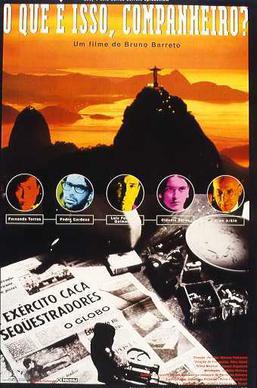
Four Days in September is a 1997 Brazilian thriller film directed by Bruno Barreto and produced by his parents Lucy and Luiz Carlos Barreto. It is a dramatized version of the 1969 kidnapping of the United States Ambassador to Brazil, Charles Burke Elbrick, by members of Revolutionary Movement 8th October (MR-8) and Ação Libertadora Nacional (ALN).
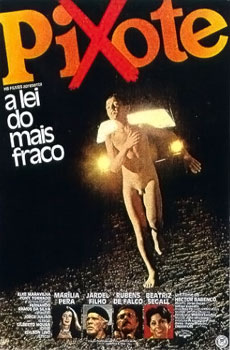
Pixote: a Lei do Mais Fraco is a 1980 Brazilian crime drama film directed by Héctor Babenco. The screenplay was written by Babenco and Jorge Durán, based on the book A Infância dos Mortos by José Louzeiro. The film is a docudrama account of Brazil's lower classes youth exposure to organized crime and police corruption.
The Arch is a 1968 Hong Kong drama film directed by Tang Shu Shuen. The film was selected as the Hong Kong entry for the Best Foreign Language Film at the 42nd Academy Awards, but was not accepted as a nominee.
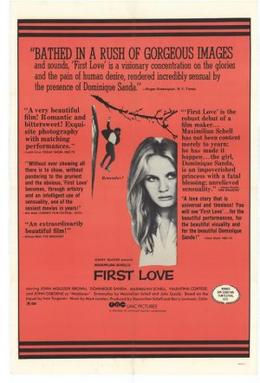
First Love is a 1970 film, written, directed, produced and starred in by Austrian director Maximilian Schell. It is an adaptation of Ivan Turgenev's 1860 novella of the same name, starring Schell, Dominique Sanda, and John Moulder-Brown.

No Stars in the Jungle is a 1967 Peruvian adventure drama film directed by Armando Robles Godoy. The film won the Golden Prize at the 5th Moscow International Film Festival in 1967. The film was also selected as the Peruvian entry for the Best Foreign Language Film at the 40th Academy Awards, but was not accepted as a nominee.
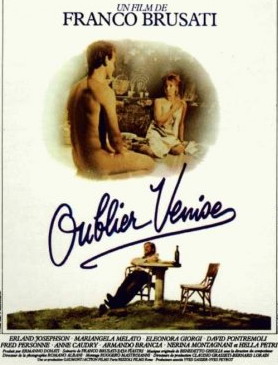
To Forget Venice is a 1979 Italian drama film written and directed by Franco Brusati. It was nominated for the Academy Award for Best Foreign Language Film at the 52nd Academy Awards.

Hunting Scenes from Bavaria is a 1969 West German film directed by Peter Fleischmann. It is based on a play of the same name by Martin Sperr, who also played the main role in the film. It was chosen as West Germany's official submission to the 42nd Academy Awards for Best Foreign Language Film, but did not manage to receive a nomination.
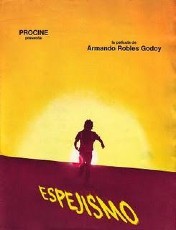
Mirage is a 1972 Peruvian drama film directed by Armando Robles Godoy. Robles Godoy wrote the screenplay together with Bernardo Batievsky. It is the only Peruvian film to date to be nominated for a Golden Globe Award.

Destiny is a 1997 Egyptian-French historical drama film directed and co-written by Youssef Chahine. It was screened out of competition at the 1997 Cannes Film Festival. The film was selected as the Egyptian entry for the Best Foreign Language Film at the 70th Academy Awards, but was not accepted as a nominee.

Ballad of Carl-Henning is a 1969 Danish comedy film written and directed by Sven and Lene Grønlykke. The film won a Bodil Award for Best Danish Film and Jesper Klein won the award for Best Actor in a Leading Role of 1969.

Armando Robles Godoy was a Peruvian film director. He was son of the Peruvian composer Daniel Alomía Robles and Carmela Godoy. His 1967 film En la selva no hay estrellas won the Golden Prize at the 5th Moscow International Film Festival in 1967. In 1971 he was a member of the jury at the 7th Moscow International Film Festival. Director of Espejismo, so far the only Peruvian film to have been nominated to a Golden Globe award.
Pafnucio Santo is a 1977 Mexican drama film directed by Rafael Corkidi. The film was selected as the Mexican entry for the Best Foreign Language Film at the 50th Academy Awards, but was not accepted as a nominee.
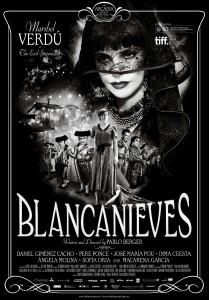
Blancanieves is a 2012 Spanish black-and-white silent drama film written and directed by Pablo Berger. Based on the 1812 fairy tale Snow White by the Brothers Grimm, the story is set in a romantic vision of 1920s Andalusia. However, the film approaches storytelling through the integration of Spanish culture from characters' names to traditions they follow. Additionally, the film alludes to other fairy tales including Cinderella and Little Red Riding Hood. While it retells stories originally told through tales based in fantasy, it derails from the traditional storytelling method that ends with a happily ever after. Instead, the film is rather dark and ends in tragedy. Berger calls it a "love letter to European silent cinema."

The Cleaner is a 2012 Peruvian drama film written and directed by Adrián Saba. The film was selected as the Peruvian entry for the Best Foreign Language Film at the 86th Academy Awards, but it was not nominated.

The Gospel of the Flesh is a 2013 Peruvian crime drama thriller film directed by Eduardo Mendoza de Echave. It was selected as the Peruvian entry for the Best Foreign Language Film at the 87th Academy Awards, but was not nominated. It premiered on 17 October 2013 in Lima and several other provinces.

El Angel is a 2018 Argentine-Spanish true crime film directed by Luis Ortega. It was screened in the Un Certain Regard section at the 2018 Cannes Film Festival. It is inspired by the true story of Argentine serial killer Carlos Robledo Puch. It was selected as the Argentine entry for the Best Foreign Language Film at the 91st Academy Awards, but it was not nominated.

Eternity is a 2018 Peruvian drama film directed by Óscar Catacora. It was selected as the Peruvian entry for the Best Foreign Language Film at the 91st Academy Awards, but it was not nominated. It is the first film to be done entirely in the Aymara language.

Days of Santiago is a 2004 Peruvian drama film directed by Josué Méndez. It was selected as the Peruvian entry for the Best Foreign Language Film at the 78th Academy Awards, but it was not nominated.
















